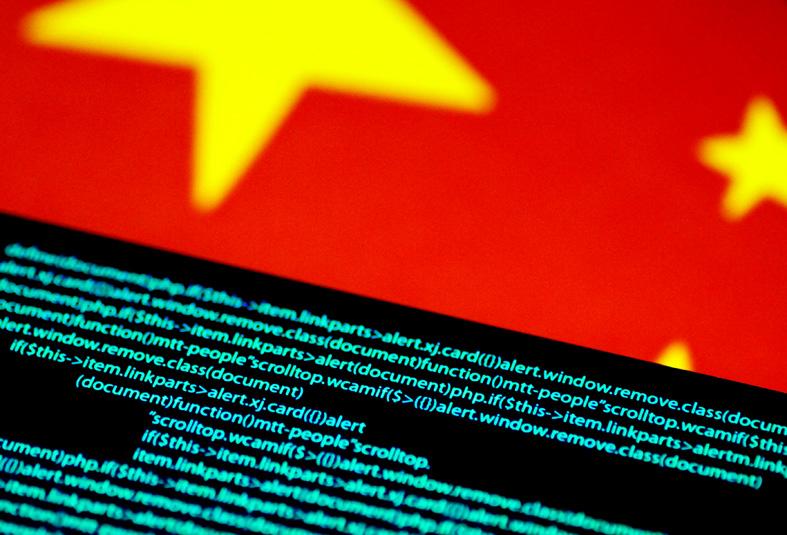At least 900 cybersecurity positions would need to be filled at various central and local government agencies to protect the nation’s information technology (IT) infrastructure and combat escalating Chinese attacks, sources said.
For example, central government agencies categorized as level A each need four full-time cybersecurity staff, the sources said.
Level B government agencies need three cybersecurity staff each and level C agencies need one each, they said, adding that government agencies in level D and level E do not have their own core IT networks, and their cybersecurity work could be outsourced to the private sector.

Photo: Reuters
Noting the Executive Yuan’s plan to establish a ministry of digital development next year to bolster information security and encourage growth in related industries, sources said the planned ministry would have an agency that might need to hire up to 200 cybersecurity professionals, as the Executive Yuan’s Department of Cyber Security has only 24 full-time staff.
As the new positions would entail classified information and national security concerns, the Executive Yuan cannot provide specifics on the cybersecurity levels of every government agency, but a shortage cybersecurity staff is widely known, the sources said.
The positions would be filled in stages as the Executive Yuan looks for qualified professionals in the IT sector, or recent graduates from universities’ digital technology departments.
A short-term solution could be to train current IT staff at government offices and convert them into cybersecurity workers, they added.
Additional reporting by Jason Pan

Alain Robert, known as the "French Spider-Man," praised Alex Honnold as exceptionally well-prepared after the US climber completed a free solo ascent of Taipei 101 yesterday. Robert said Honnold's ascent of the 508m-tall skyscraper in just more than one-and-a-half hours without using safety ropes or equipment was a remarkable achievement. "This is my life," he said in an interview conducted in French, adding that he liked the feeling of being "on the edge of danger." The 63-year-old Frenchman climbed Taipei 101 using ropes in December 2004, taking about four hours to reach the top. On a one-to-10 scale of difficulty, Robert said Taipei 101

Nipah virus infection is to be officially listed as a category 5 notifiable infectious disease in Taiwan in March, while clinical treatment guidelines are being formulated, the Centers for Disease Control (CDC) said yesterday. With Nipah infections being reported in other countries and considering its relatively high fatality rate, the centers on Jan. 16 announced that it would be listed as a notifiable infectious disease to bolster the nation’s systematic early warning system and increase public awareness, the CDC said. Bangladesh reported four fatal cases last year in separate districts, with three linked to raw date palm sap consumption, CDC Epidemic Intelligence

Two Taiwanese prosecutors were questioned by Chinese security personnel at their hotel during a trip to China’s Henan Province this month, the Mainland Affairs Council (MAC) said yesterday. The officers had personal information on the prosecutors, including “when they were assigned to their posts, their work locations and job titles,” MAC Deputy Minister and spokesman Liang Wen-chieh (梁文傑) said. On top of asking about their agencies and positions, the officers also questioned the prosecutors about the Cross-Strait Joint Crime-Fighting and Judicial Mutual Assistance Agreement, a pact that serves as the framework for Taiwan-China cooperation on combating crime and providing judicial assistance, Liang

US climber Alex Honnold left Taiwan this morning a day after completing a free-solo ascent of Taipei 101, a feat that drew cheers from onlookers and gained widespread international attention. Honnold yesterday scaled the 101-story skyscraper without a rope or safety harness. The climb — the highest urban free-solo ascent ever attempted — took just more than 90 minutes and was streamed live on Netflix. It was covered by major international news outlets including CNN, the New York Times, the Guardian and the Wall Street Journal. As Honnold prepared to leave Taiwan today, he attracted a crowd when he and his wife, Sanni,